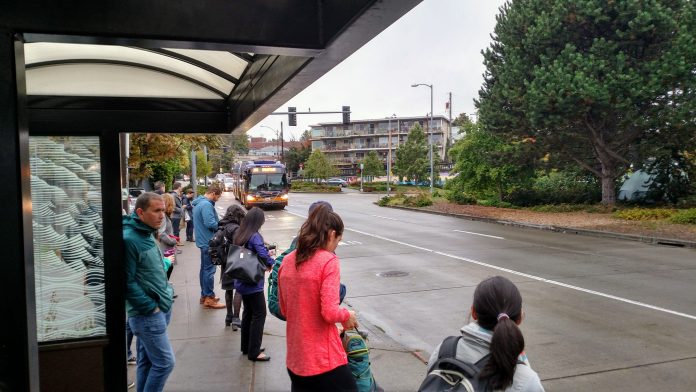The Seattle City Council is about to vote on the Seattle Transportation Benefit District (STBD) and decide the measure that appears on the ballot in November. We’ve covered the issue closely from the days when a countywide proposal was still on a table to when when it was shelved to the recent jockeying about the right size for the Seattle only proposal to replacing the STBD expiring at year’s end.
I praised Councilmember Tammy Morales’ amendment doubling the STBD proposal and issued a call to action to contact the Seattle City Council to back it. We’ve also documented the benefits the STBD has provided over the years, from the 30% boost to the busiest 15 bus routes noted in the 2017 update to onward march of very frequent transit service which expanded to be in the 10-minute walkshed of 67% of Seattle’s population in 2018 and reached 70% last year.
Our transportation reporter Ryan Packer and many members of the Move All Seattle Sustainably coalition testified during public comment today, including Rooted in Rights, Sierra Club, 350 Seattle, Seattle Subway, Seattle Transit Riders Union. I also submitted the following letter.
Dear Seattle City Councilmembers,
I urge you to support Councilmember Tammy Morales’ amendment doubling the size of the Seattle Transportation Benefit District (STBD) proposal by raising the sales tax from 0.1% to 0.2%. This is essential to ensure transit remains a viable option for those that depend on it now and an attractive option to entice people out of more carbon-intensive commutes. Our climate goals depend on frequent bus service.
We at The Urbanist share your desire to right-side up our upside down tax code, taking a state tax code that has been ranked the most regressive in taxation into one of the most progressive. However, we must weigh what would be a largely symbolic move at this point against the very real harm caused by a nearly 80% cut in STBD bus service that Mayor Jenny Durkan has proposed. I’m a District 4 resident and buses I rely on like Route 5, Route 62, Route 40, and Route 44 would see major cuts if we proceed with the bare-bones measure on the table.
If the argument is that a 0.2% sales tax is too regressive, a 0.1% sales tax probably is too. Let’s reject that framing; quality transit service is a key part of the social safety net that redistributes wealth and opportunity toward lower-income folks. The loss of the flat $60 vehicle license fee (that formerly provided the bulk of STBD funding) will lower the tax burden on most car-owning households via lower car tabs.
I can’t imagine a Seattle City Council actively choosing to turn our 10-minute very frequent bus service network, which serves 70% of Seattle’s population, into a 15-minute network. That’s a huge downgrade in service. The extra five minutes in headways mean an extra five minutes wasted waiting for the bus during every round trip for every rider. Motorists expect billion-dollar freeway expansions when they face five-minute delays. We bus riders only ask that you make this relatively small investment to avoid a transit death spiral.
While some councilmembers have argued that 0.1% or 0.15% is the Goldilocks number that is neither too regressive nor too much of a sticker shock for a recession electorate. As a transit advocate that has campaigned hard for past measures, I think the opposite is true. A 0.1% difference isn’t likely to register among voters, and the last measure passed easily with 62.4% of the vote. The risk is to not have real benefits to run on. The nearly 80% cut in the Mayor’s proposal is not an inspiring measure. People will recognize it’s going backwards. We need to offer voters a real continuation of service. We may not get two bites at the apple if our STBD proves insufficient.
The Covid pandemic has certainly complicated the decision-making process, but transit remains an essential service to essential workers and non car owners like me that make up 20% of Seattle households. Transit ridership is down, but Metro has said it expects a full rebound once social distancing measures are relaxed and the economy picks up. We are making a four- to six-year decision and must plan for that rebound. We cannot meet this public health crisis with austerity. Transit is a major lifeline for cash-strapped households, particularly during the recession.
To paraphrase Katie Wilson, the $9 to $12 in sales tax savings you could provide a low income household by not doubling the measure could be erased by a single ridehailing trip. We have to keep transit a viable option. Please adopt Councilmember Morales’ amendment and continue to seek progressive countywide transit funding.
Doug Trumm is publisher of The Urbanist. An Urbanist writer since 2015, he dreams of pedestrian streets, bus lanes, and a mass-timber building spree to end our housing crisis. He graduated from the Evans School of Public Policy and Governance at the University of Washington in 2019. He lives in Seattle's Fremont neighborhood and loves to explore the city by foot and by bike.


